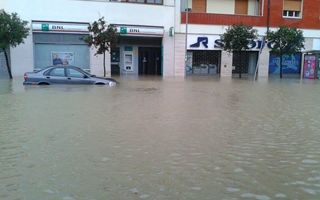(Finance) – Insignificant sums paid to businesses, ‘zero comma’ refreshments, in the face of an unacceptable narrative made up of announcements of 100% refunds, while the reality is made up of bureaucracy, slowness and funds never arriving. There are many things that don’t add up in the process of rebuilding the economic fabric that should have followed the flood of May 2023. “Let’s hurry, it’s late” is the cry of alarm with which Legacoop brought together its companies in Ravenna, one year after the beginning of those tragic events, to take stock of the situation in front of over 200 cooperators. The location of the initiative is the Copura warehouses, one of the 22 companies associated with Legacoop Romagna that were invaded by water and have now restarted thanks mainly to the efforts of their members and the cooperative system.
“The data made public in April in the press by the commissioner structure – said the president of Legacoop Romagna, Paolo Lucchi — they tell us that until a few days ago the applications completed on the Sfinge platform were 775, of which just 63 had passed the Invitalia check. There were around forty practices ready for liquidation, for a value of 1.5 million euros, but there were 29 practices that had received a first part of the contribution, for a total of 400 thousand euros. Can someone explain these figures to us, given that almost 90 thousand people were damaged by the flood, including 16 thousand businesses, and the estimated damages in Emilia-Romagna are 8.5 billion, of which 3.5 to private individuals? We were promised 100% refreshments, but it is increasingly difficult to declare ourselves optimistic.”
“A really worrying chapter concerns the farms affected by the flood – added the Ravenna coordinator of Legacoop Romagna, Mirco Bagnari -, Why nothing has arrived from the state yet. Instead, European funds from the EU crisis reserve were disbursed, bringing the funds reaching the primary sector to around 150 million euros. As regards public reconstruction, the damage to infrastructure is estimated at around 5 billion, but the overall resources provided by the Government and the Commission Structure were less than a tenth. Other problems concern the impossibility of compensating movable property lost following the flood and the failure to activate the tax credit mechanism, in addition to the problems with the PNRR”.
“The cooperatives associated with Legacoop Romagna – concluded the president of Legacoop, Simone Gamberini – have suffered around 45 million euros in damage, but the flood affected a very large area which also includes Bologna, Reggio Emilia and Modena, an area worth several tens of billions of GDP. Unfortunately, the Government’s bombastic declarations of commitment in the days following the disaster were not followed by facts and a year later we are still waiting for full reimbursement of the damages suffered. The commissioner structure, with which we have actively collaborated in recent months, has had to operate with ordinary bureaucratic procedures which have severely slowed down the disbursement of refreshments. We have fully done our part to not leave cooperatives and communities alone, mobilizing more than six million euros of solidarity resources, and we will continue to do so. Also for this we demand answers and expect a sense of responsibility from the institutions and respect for those who risk falling into resignation”.
